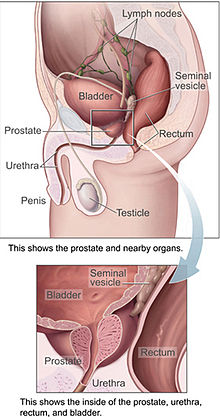
Prostate cancer is cancer that starts in the prostate gland. The prostate is a small, walnut-sized structure that makes up part of a man's reproductive system. It wraps around the urethra, the tube that carries urine out of the body.
Causes, Incidence, and Risk FactorsProstate cancer is the third most common cause of death from cancer in men of all ages and is the most common cause of death from cancer in men over age 75. Prostate cancer is rarely found in men younger than 40.
- People who are at higher risk include:
- African-American men, who are also likely to develop cancer at every age
- Men who are older than 60
- Men who have a father or brother with prostate cancer
- Other people at risk include:
- Men exposed to agent orange exposure
- Men who abuse alcohol
- Farmers
- Men who eat a diet high in fact, especially animal fat
- Tire plant workers
- Painters
- Men who have been exposed to cadmium
A common problem in almost all men as they grow older is an enlarged prostate (benign prostatic hyperplasia, or BPH). This problem does not raise your risk of prostate cancer.
- Signs and Tests
- Delayed or slowed start of urinary stream
- Dribbling or leakage of urine, most often after urinating
- Slow urinary stream
- Straining when urinating, or not being able to empty out all of the urine
- Blood in the urine or semen
- Bone pain or tenderness, most often in the lower back and pelvic bones (only when the cancer has spread)
The PSA blood test is often done to screen men for prostate cancer. Because of PSA testing, most prostate cancers are now found before they cause any symptoms.
The symptoms listed below can occur with prostate cancer (Most of the time these symptoms are caused by other prostate problems that are not cancer):
Treatment
The best treatment for your prostate cancer may not always be clear. Sometimes, your doctor may recommend one treatment because of what is known about your type of cancer and your risk factors. Other times, your doctor will talk with you about two or more treatments that could be good for your cancer.
In the early stages, talk to your doctor about several options, including surgery and radiation therapy. In older patients, simply monitoring the cancer with PSA tests and biopsies may be an option. Prostate cancer that has spread may be treated with drugs to reduce testosterone levels, surgery to remove the testes, or chemotherapy.
Surgery, radiation therapy, and hormonal therapy can interfere with sexual desire or performance. Problems with urine control are common after surgery and radiation therapy. These problems may either improve over time or get worse, depending on the treatment. Discuss your concerns with your health care provider.
MONITORING
After treatment for prostate cancer, you will be closely watched to make sure the cancer does not spread. This involves routine doctor check-ups, including serial PSA blood tests (usually every 3 months to 1 year).
Many patients with prostate cancer that has not spread can be cured, as well as some patients whose cancer has not spread very much outside the prostate gland.
Even for patients who cannot be cured, hormone treatment can extend their life by many years.
- Complications
- The complications of prostate cancer are mostly due to different treatments.
- Calling your health care provider
- Discuss the advantages and disadvantages to PSA screening with your health care provider.
